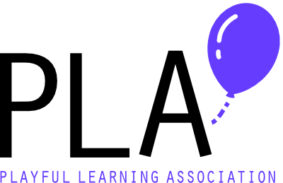A Gathering, A Picking
Corresponding Author: Rachel Haley Himmelheber
All authors:
Length: 60 minutes
Location: Gallery Room 1
Description:
This workshop will focus on an undergraduate college course I am teaching spring 2024 called Play and Practice for the Artist. This course is project-based, with each student participating in readings and discussion before creating a personal project focused on their own playful creative practice.
This workshop would be particularly relevant for other playful teachers or facilitators, for artists, or for any adults who wish to examine how a playful creative practice can better fit into their lives.
In this workshop, participants will gain an overview of how I structured this course, with particular attention paid to how I made space to learn and play alongside students while teaching the course. I will also include what I imagine may be resonant bits of my narrative: how I came to the world of play scholarship in the pandemic, in a mid-life disciplinary crisis, in a floundering state of grief, and what lessons I have taken from both trying to teach more playfully, and from teaching play explicitly as content. I expect by sharing lessons with other teachers I will learn so much, which is always a goal of mine in sharing my own work.
Most surprising to me of these lessons, although perhaps obvious in retrospect, is how un-fun and un-playful some of it has been for me as the instructor. How utterly requiring of a paradigm shift it has been. Teaching play has been uncomfortable, it has forced me to change my mind about some long-held pedagogical beliefs, and it has thrown my confidence at times. As an artist in higher education–my field is creative writing, with an emphasis on fiction–I am used to how crucial my own practice is to my pedagogy. That I write fiction myself, that I read our course texts and design assignments as a practitioner, all of that feels essential to who I am as a teacher. So in this new-to-me area of play scholarship, my fear has always been that I’d hear someone on campus whisper, “Who is that dour looking person?” And another would whisper back, “That’s the professor who teaches about play.”
Participants will enact a few of the course’s activities, including constructing their own play histories, with an emphasis on reflecting on how their preferred childhood modes of play show up (or don’t) in their adult lives. Participants will also begin to reflect upon some of the major questions of the course, including:
*What do I wish I were doing/paying attention to?
*Are there spatial and temporal aspects to paying attention that I might enact? How might a bioregionalist approach to hanging out with my playful, curious self look?
*Do I spend enough time in my inner life?
From these questions, and from examples I share from the course projects, participants can begin to map out what a creative playful practice might look like for each of them. Some of these activities will be reflective and some will be shared in small groups.
References, web links and other resources:
Here are references I have actively used in drafting this proposal. If my workshop is selected, there may be more by the time of the conference.
Burr, Brandon and Ladonna Atkins, Anita Glee Bertram, Kaye Sears & Andreae N. McGinnis. “If you stop playing you get old”: investigating reflections of play in older adults. Educational Gerontology vol 45, no.5, 2019, pp 353-64.
Fasting, Merete Lund and Jannicke Høyem Freedom, “joy and wonder as existential categories of childhood – reflections on experiences and memories of outdoor play.” Journal of Adventure Education and Outdoor Learning, 2022, DOI: 10.1080/14729679.2022.2066008.
James, Allison. “Making A Case for the Playful University.” The Power of Play in Higher Education: Creativity in Tertiary Learning. eds Allison James and Chrissi Nerantzi, Palgrave Macmillan, 2019, pp 1-19.
Lauricella, Sharon and Edmunds, T. Keith. “Ludic Pedagogy: Taking a serious look at fun in the COVID-19 classroom and beyond,” Educational Considerations, vol. 48, no. 1, 2022, https://doi.org/10.4148/ 0146-9282.2324.
Leather, M., Harper, N., & Obee, P. “A pedagogy of play. Reasons to be playful in post-secondary education.” Journal of Experiential Education, 2020, https://doi.org/10.1177/1053825920959684.
Odell, Jenny. How to Do Nothing: Resisting the Attention Economy. Melville House, 2019.
Sandberg, Anette. “Play Memories and Place Identity.” Early Child Development and Care, vol 173, no.2-3, 2003, pp 207-21.
Whitton, Nicola. “Playful learning: tools, techniques, and tactics.” Research in Learning Technology, vol 26, 2018.
